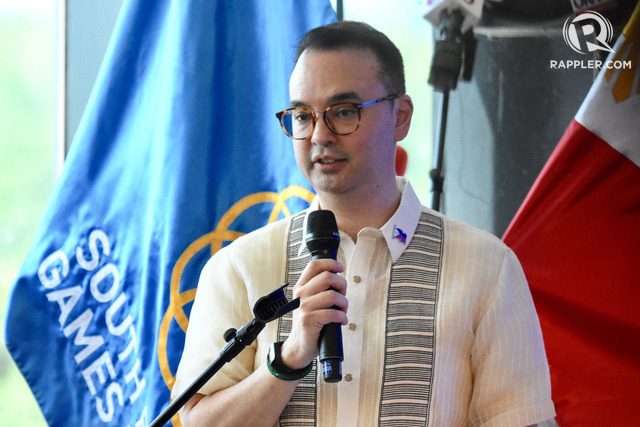SUMMARY
This is AI generated summarization, which may have errors. For context, always refer to the full article.

MANILA, Philippines – Is it constitutional for House Speaker Alan Peter Cayetano to be the chairperson of the Philippine Southeast Asian Games Organizing Committee (PHISGOC)?
Two constitutional provisions, and a past Supreme Court case come into play in that question.
PHISGOC is a private foundation of sorts constituted for the Philippines’ hosting of the 30th Southeast Asian Games (SEA Games). Its leadership is composed equally of officials from the Philippine Olympic Committee (POC), Philippine Sports Commission (PSC), and other government representatives, according to Cayetano.
PHISGOC registered with the Securities and Exchange Commission (SEC) as a “non-stock, non-profit corporation” in June 2018, according to its SEC papers obtained by Rappler.
At this time, Cayetano was still the foreign secretary.
Section 13, Article VII of the Constitution says members of the Cabinet “shall not, unless otherwise provided in this Constitution, hold any other office or employment during their tenure.”
“They shall not, during said tenure, directly or indirectly, practice any other profession, participate in any business, or be financially interested in any contract with, or in any franchise, or special privilege granted by the Government or any subdivision, agency, or instrumentality thereof, including government-owned or controlled corporations or their subsidiaries,” the provision further says.
Cayetano continued to chair PHISGOC even after being elected to the House of Representatives and eventually being chosen as Speaker.
Section 13, Article VI of the Constitution says “no Senator or Member of the House of Representatives may hold any other office or employment in the Government, or any subdivision, agency, or instrumentality thereof, including government-owned or controlled corporations or their subsidiaries, during his term without forfeiting his seat.”
“Neither shall he be appointed to any office which may have been created or the emoluments thereof increased during the term for which he was elected,” the provision adds.
But PHISGOC is a private organization
The question is: does PHISGOC – which registered itself as a non-profit – belong to the offices or government instrumentalities being referred to in the Constitution?
“PHISGOC from my understanding was organized as a private organization, but in this particular case, the money comes from government, the officials are from government. If it doesn’t break the letter of the law, it breaks the spirit of the law,” said constitutional law professor Tony La Viña.
La Viña pointed out a Supreme Court decision from 2002 where former vice president Salvador Laurel was charged with graft by then-ombudsman Aniano Desierto, involving the former’s work as chairman of the National Centennial Commission (NCC).
Laurel argued that the Ombudsman did not have jurisdiction over him as NCC was not a public office. In that case, the Supreme Court said: “the NCC performs sovereign functions. It is, therefore, a public office, and petitioner, as its Chair, is a public officer.”
The NCC was to take charge of the country’s celebration of the Philippine Centennial. It would be abolished once celebrations were done. One can draw comparisons about how PHISGOC was also formed just for the hosting of the 30th SEA Games. Under SEA Games Federation Rules, the power of the committee “shall cease at the end of the Games.”
According to Cayetano, around P1.5 billion of PHISGOC funds was sourced from the PSC’s 2019 budget, or from the overall P6 billion allotted to the PSC for the hosting of the SEA Games.
The P1.5-billion fund was transferred from PSC to PHISGOC via “financial assistance” and will not undergo public bidding.
In a chance interview with reporters on Thursday, November 28, Cayetano said there is “no conflict of interest.”
“So madali naman dumakdak eh. Madaling sabihin na may conflict of interest. Nasaan ba kayo nung kailangan kayo ng PHISGOC? ‘Di sana nag-volunteer kayo, sana kayo ang nag-chairman, sana kayo ang nag-ano ng pera ‘di ba?” added the visibly irked Speaker.
(It’s so easy to talk. It’s so easy to say there’s conflict of interest. But where were you when PHISGOC needed you? You should have volunteered, you should have been the chair, you should have given us the money, right?)
President Rodrigo Duterte is the chairman emeritus of PHISGOC. – Rappler.com
Add a comment
How does this make you feel?
There are no comments yet. Add your comment to start the conversation.